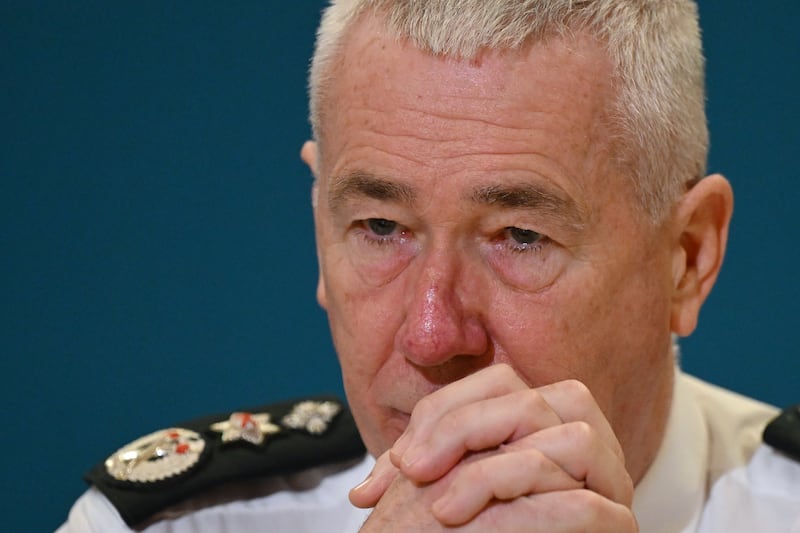When I first get in touch with former RTÉ broadcaster Mike Murphy to see if he’s amenable to being interviewed by The Irish Times, he is bemused. “What could there possibly be about me that would have the vaguest interest for your readers?” he asks by text message. “I’m in the ‘you’re looking well’ category, meaning ‘I thought you were no longer with us’.” He suggests I give him a call to discuss, so I do and after a bit of persuasion on my part – “you’re Mike Flipping Murphy!” – we arrange to meet.
While younger readers might need a bit more of an introduction Murphy, for many of us, is a broadcasting legend up there with the late Gay Byrne who was a dear friend of his. Murphy started in RTÉ in 1965 as an announcer and became beloved for his candid camera skits on Live Mike, his memorable stint on Murphy’s Micro Quiz-M and exemplary hosting for 12 years of the Arts Show back when the arts were deemed important enough to be covered for two hours in the afternoon on RTÉ Radio 1. He hosted the Eurovision commentary for years and was the first presenter of Winning Streak. His legend endures despite his tendency towards self-deprecation. He is approached twice for selfies when we meet by middle-aged men who are chuffed to find themselves in his vicinity. One of them has particularly fond memories of the Ford Orion cars that were given away on his quiz show.
Murphy, who grew up in Dublin, lives with his wife Annie Walsh, his former RTÉ Radio producer, in an apartment in Ballsbridge so I’ve booked a table at The Lobster Pot restaurant in the village. It’s early on Friday evening when I arrive to discover there is no record of our booking. I have apparently booked The Lobster Pot in Wexford by mistake. Thankfully, the lovely staff find us a quiet corner table and the charming waiter – at 83, he’s the same age as Murphy – gives us the lowdown on the fish selection available that evening. Murphy and I both opt for prawns followed by fish goujons and he has a glass of white wine. He asks a couple of times during our three-hour conversation whether he is boring me. (For the record, Murphy is the furthest thing from a bore.)
In fact, he is great, gregarious company, reeling off anecdotes and asides in that distinctive crystal clear voice. He tells me he got to meet Roy Keane earlier in the day and the pair apparently hit it off. “There aren’t many people I would have said I wanted to meet but he is one,” he explains. A mutual friend set it up. He was told Keane had 10 minutes to spare before heading down to Cork but they ended up talking for over an hour.
RM Block

He told Keane about how in 2023, to his surprise, he was made an honorary Corkman at a ceremony in the city. Then the first-class storyteller tells me a tale he told Keane earlier that day. One day playing golf with American friends in Naples, Florida, where he and his wife had a holiday home for decades, Murphy sank a long putt to win a match and bellowed in delight: “Take that from the mothers of Cork!” The Americans were intrigued. Murphy had heard the phrase from a friend in Youghal and so he told them the phrase’s origin story.
“Many years ago, Cork Celtic soccer club brought over a few English players and one of them was an English guy named Carl Davenport. He was a centre forward, a handsome and flamboyant fella, and the rumours were that he was causing havoc with the young women of Cork. We’re talking about the 1960s or 1970s, okay? And because of this he was the subject of local scandal and all that kind of thing.” I go looking for confirmation of all this to appease Irish Times legal advisers – Davenport is 81 – and find an interview with the League of Ireland star from 2018 in which he apparently told a reporter he slept with more than 2,000 women. Carry on so, Mike.
“Anyway, a big centre forward was marking Davenport, and a ball came down the middle of the field. The ball went up and as the two players headed it they collided. The other centre forward’s knee caught Davenport in a very embarrassing part of his anatomy whereupon the Dav let out a roar and fell to the ground, clutching himself. The referee blew the whistle and stopped the whole thing. That’s when a voice came from the terraces: ‘Take that from the mothers of Cork’.” So now there are a load of golfers in Florida using the same phrase, having heard it from Murphy. “Roy loved that story,” he smiles.
Until a few years ago, Murphy spent a good deal of time in Florida with Walsh. They left after the couple’s apartment was hit by a hurricane but he says even before that, Trump’s rise to power also influenced their decision to sell up. “All the guys I played [golf] with turned out to be Trumpites. Every single one of them. And over lunch one day, talking about Trump, one of the guys went to hit me … now he didn’t actually hit me, he had his fist back and then he stopped. But it was a shock. And the thing was, all of the rest of them were on his side.” Are they still friends? “Well, no, not really. Not any more.”

Murphy is full of stories. He tells another one about the time he was involved in the building and marketing of Titanic Belfast museum. (While working at RTÉ and after leaving in 2001, he became involved in the property company Harcourt, owned by Pat Doherty. There is a perception that he made a lot of money from his marketing role with them – “I didn’t but I wasn’t on the breadline.” When the crash happened “there was no room for some of the directors of Harcourt, including me, and I said thanks very much, I have to go”.)
At one time the company sponsored a competition of school choirs in Belfast. Martin McGuinness, who was then deputy first minister at Stormont, was the guest of honour. “I’d never met the guy but he caught my eye and came down to me. Then he said ‘Do you mind if we have a quick word together before the thing starts?’ So they went backstage and McGuinness told him that for years, when he was on the run from the British army, he had to change his location almost nightly so he wouldn’t be caught. But he told Murphy that on Friday nights, he would have been easy to find because he used to go home to his mother’s house in Derry’s Bogside to watch The Live Mike. “I was actually quite pleased,” Murphy smiles.

We talk about his schooldays in Terenure College. He failed the entrance exams which led to a three-week-spell at Synge Street CBS where he says he was beaten up by both pupils and Christian Brothers for wearing his Terenure cap. He went back to Terenure. Later, he enjoyed a brief stage and film acting career before deciding he didn’t want to pretend to be someone else all day: “I was finding it difficult enough to be myself.” He got into broadcasting almost by accident, motivated by curiosity and the opportunity to learn rather than by fame or fortune.
“I was never a dedicated broadcaster like Gay or Pat Kenny or Joe Duffy. Broadcasting was their life. It wasn’t for me. I never felt that I had a major talent for broadcasting, but I had a facility, and I was able to do the things I wanted to do in my life through broadcasting. I knew the kind of things I wanted to do.” He mentions, as examples, his travel shows Murphy’s America and Murphy’s Australia. “And I tried to avoid doing the things I didn’t want to do.”
He had a torrid time in the 1990s after the break-up of his marriage to the late Eileen Murphy, falling in love with his radio producer Walsh while still married. “Since then, we’ve seen so many marriages break down. It was kind of one of the first celebrity – which is my least favourite word in the English language – break-ups. We were married young; 23 and really innocent And then one changes. As you get older, you change, and personalities differ, choices differ, compatibility maybe suffers a bit. And then the kids start to leave, and suddenly … well then I met Annie and that was kind of it, really.”
He still has a fondness for RTÉ but is scathing of how Ryan Tubridy was treated during the payments scandal. “I feel very sorry for him, he was treated very badly. He was made the scapegoat,” he says, tucking into his prawns. “The truth of the matter is that I’d have taken the deal Tubridy took. I would have taken it on the basis that RTÉ came up with the idea to get the sponsor to pay the balance of his salary. As long as I was clear with the tax man and RTÉ were clear with it, then I’d go with it because I’m certainly not interested in discussing what salary I am earning and if you guys [RTÉ] make it public it’s your problem. So it should, in my view, have been the RTÉ Payments Scandal not the Ryan Tubridy Payments Scandal.”
He had a “wonderful” time with the broadcaster but he doesn’t listen to the radio any more, preferring to read books, watch movies and spend time with family, Walsh “the love of my life”, his four children and grandson Mac, a promising basketball player. He hasn’t been on the RTÉ campus in a long time. “I wouldn’t know anybody in there now, and they wouldn’t know me either, let’s be brutally frank. Who’s he? It’s very hard to convince people I used to be famous.”

As our conversation comes to a close we chat over empty plates about religion and ageing and what happens when we die. “All the cheery stuff,” he laughs. (He had told me earlier that this might be his last interview, so in case he’s right I decide these are pertinent topics.) Murphy’s mother and father were deeply religious and he went to Mass for years himself but gradually “as I began to read more and think for myself I began to wonder”. He has no faith now. “I think when you die you fall off the edge of the Earth and the Earth keeps turning.”
I tell him my 86-year-old mother Ann is writing a book about ageing and that she is in favour of euthanasia. He feels the same. “I’ve lived 83 years, and I’ve had a great life. Why would I want to be a burden? And also, the humiliation of not being able to do things for myself … so I’d be along the same lines as your mother,” he says.
[ From the archive: Mike Murphy: ‘I won’t do another over-70s lockdown’Opens in new window ]
Will he have a religious funeral? “I always thought I’d go straight for cremation but for my family’s sake I’d like to have a church burial.” And then he’s back in storytelling mode, remembering a moment from the funeral of jazz guitarist Louis Stewart who died in 2016. Murphy recalls Stewart’s son telling the congregation how, before he died, he plucked up the courage to ask his father a difficult question: ‘Burial or cremation?’ And Louis Stewart replied: ‘Surprise me’.
“Isn’t it brilliant?” Murphy says, giggling. It is. And so is Murphy.





















